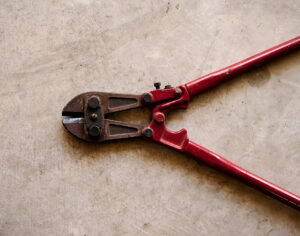The ferry was running late. New to island living, my friend hadn’t planned for the ways wind and water might shape his day. Now he would miss his meeting. Frustrated, he texted a colleague to ask her to cover for him. But wait! They seemed to be speeding up. The boat made landfall earlier than expected; he and his wife sped home in the car. While she drove, he texted the colleague again: “No problem! We’re going to make it home!” And they did. Eager, they tried their shiny new keys in the backdoor lock – no matches. A key opened the front door, but – alas! – the chain lock was engaged. They couldn’t get in!
Back in the car and off to the hardware store seeking help. On his way, he asked himself the central question of Mindful Self-Compassion (MSC): “What do I need right now?” Well, he thought, I need kindness, I need patience . . . I need a pair of bolt cutters! Happily, he got all three. He offered himself patience and kindness; the clerk at the hardware store loaned out their bolt cutters. They zipped back to the house, snapped the chain, and he made it to his meeting.
When my friend shared this story, I was tickled. Bolt cutters: my favorite new self-compassion tool! And yet, he’s absolutely right: kindness and patience alone would not cut it. He needed resources, action. He needed both aspects of self-compassion, the tender and the fierce.
Mindful self-compassion is the practice of learning to befriend ourselves in any moment, especially when things are tough. When we think of self-compassion, we often default to an image of warmth and kindness. This tender or yin self-compassion can feel wonderful. Our MSC workshops and classes explore the process of offering ourselves kindness in a moment of suffering, as we would to a sick child: not to make them feel better, but simply because they feel bad. Can we notice our own suffering, then offer kind words, a warm hand, or other tender care? This tenderness is an ongoing practice, a muscle we can develop over time. In my experience, it helps. But it’s not enough.
When I began studying MSC, it was a revelation that I could treat myself as well as I treated my friends. I felt deeply nourished, growing in my sense of self-worth and self-confidence as a result of treating myself better.
Still, my most challenging relationships were not improving. In any moment of stress or challenge, I worked on soothing myself. And yet I became more and more agitated. I remember wondering after yet another painful interaction, “So is this the practice? I just take it and take it and then go soothe myself?” Clearly, something was missing.
What did I need? Yep: a bolt cutter. I needed fierce self-compassion. Sometimes called yang self-compassion, this is the self-compassionate side of you that protects, provides, and motivates. This is the coach or cheerleader in you, encouraging you to do your best not with a harsh, critical voice, but because it cares about you and wants the best for you.
To revisit the sick child analogy, this is the mama bear who offers not only a cool washcloth on a hot forehead, but advocates at the doctor’s office to get the help her child needs. This aspect of self-compassion provides clarity, empowerment, and encouragement to take meaningful action. Kristen Neff, a founder of MSC with an upcoming book on fierce self-compassion, sees this element as key to social justice work: we need to soothe our pain AND take fierce, wise action.
Recently I got a call from my step-mom: my father, in treatment for cancer, had taken a turn for the worse. He’d been rushed to the ER and was now in the ICU recovering from emergency surgery. Over the next few weeks, I needed a lot of tender self-compassion. I reminded myself that this was really hard, a part of human experience, and that I was not alone. I tried to be gentle with myself.
I also needed the fierce: to ask for help at work, to research my dad’s conditions, to advocate for myself by letting go of some other responsibilities. I used my encouraging inner voice to make sure I got exercise, saying things like, “I know you feel worn out, I know it seems counterintuitive, but you will feel SO MUCH BETTER if you dance or go for a run. You can do it!” Most of the time, I did.
My dad got better every day; we’re all holding up okay. I was grateful for the tools of self-compassion I teach and practice: yin and yang, tender and fierce. I needed both sides to move through that challenge.
What are the challenges you face? Is there a place for Mindful Self-Compassion? Might you offer yourself a little more kindness? And how could you advocate for yourself, asking for what you need? This practice is not always easy, but it can feel awfully good. I would love to hear about your experiments. Kindness, patience, bolt cutters: what do you need right now?



